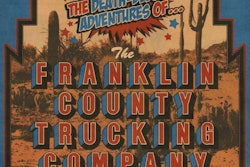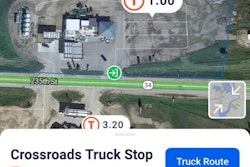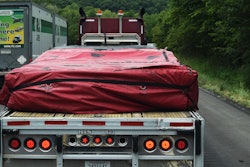I’ve recently had a few conversations with other truck owners who, like myself, have their own operating authority. Each conversation took me back 25 years to my earliest experiences and challenges with my authority. As I always seem to do when I have these conversations, I say “if I can help you avoid stepping into the same pile of dung I stepped into by sharing my story with you, then I’m happy to do it.”
Sadly, seldom does sharing my story ever have the positive influence I’d hoped it would. And if I’m honest, the truck owners I’m talking to are reacting the exact same way I did more than a quarter century ago, when several old-timers I knew gave me similar advice. Those old-timers would encourage me to consider changing my ways before I regretted it, just as they did.
I would think to myself, “Well, that won’t happen to me because I know not to let that happen.”
Eventually, though, the inevitable happens to all of us. Sometimes it only takes a couple of months and other times it might take a year or two. Then seemingly out of nowhere, reality hits us like a Mack truck, and the gravity of the situation sets in. For me, it happened within months, and it was devastating. I wrote about it all a while back in this article: “Think before you leap: Plan and prepare before moving beyond just one truck to grow the business.”

These recent conversations have centered around the tactic of leasing on owner-operators to rapidly grow into a fleet of trucks. On the surface, this is a very appealing option. Who could argue against not incurring additional debt for buying trucks? No truck maintenance headaches, no driver damaging the truck(s) you own... I could go on and on. It sounded so good to me that in my first years with my authority I in fact did contract with owner-operators. But just like those old-timers warned me, it didn’t take long for me to realize how big of a mistake I had made.
Sadly, that’s what I’m witnessing with some of those who have asked for my advice recently.
I know what many readers who have never leased on an owner-operator are probably thinking. What could possibly be the downside to contracting and using owner-operators? Well, there are several. Those at the top of the list include the potential of an owner-operator destroying valuable, long-established customer relationships and failing to maintain basic regulatory compliance while operating under your trucking company’s authority.
There is also the challenge of verifying the owner-operator is maintaining correct insurance coverages. Finally, another big downside, the insurance premium increases that you’re going to all but certainly incur and have to cover.
Those last couple of downsides -- insurance premium increases and maintaining correct coverages -- are the most often overlooked and misunderstood considerations.
[Related: Yes, you can reduce your trucking insurance premium ... and I have the customers to prove it!]
For the new trucking company, insurance challenges from adding owner-operators usually come pretty quick. Most insurance companies will not insure a new trucking company that has more than one truck during the trucking company’s first, and sometimes second and third or more, years in business. If a trucking company attempts to add a truck by either leasing an owner-operator or buying a truck and hiring a driver, the insurance companies who only allow for one truck will simply cancel the insurance policy.
The new trucking company is forced then to find a different insurer among the very few insurance companies available who will even consider providing an insurance policy for such a trucking company. As you might expect, those insurance companies who will consider it will do so only at higher premium rates.
If that wasn’t enough to deal with, we also have the challenge of owner-operators who have points assessed to the trucking company’s CSA Safety Measure System profile and scores because of violations found during a roadside inspection. An increased CSA score can, and frequently does, mean higher insurance premiums for several years. In some cases, the CSA score increase can even lead to loss of coverage. That is to say, the trucking company’s insurance policy may be canceled.
It’s equally important to any owner-operator considering leasing to a carrier to be certain of their relationship to the trucking company. If an owner-operator doesn’t know if the trucking company has scheduled them and their vehicle on the trucking company’s insurance policy, or that the policy has adequate coverages, the owner operator could be putting themselves at significant liability, financial risk, and out of FMCSA compliance. When a claim or accident investigation occurs, consider what would happen if the trucking company tells the investigator, “I don’t know who that is -- they are not leased to my company, and that isn’t my load or my customer.”
There is an old term that those of us from a bygone era are well aware of. The trucking company has accused the person claiming to be a leased-on owner-operator of being a good old-fashioned outlaw, running rouge and pretending to be associated with the trucking company.
With 42 years in the industry, I’ve seen and know several methods trucking companies can implement and succeed in deceiving owner-operators into falsely believing they are leased to them when, in fact, they are not. It’s fraud. I will not write about those methods or discuss them with anyone. I’m not going to give any actual fraudster, or anyone wishing to become one, any ideas that they haven’t already thought of.
[Related: Safeguard your trucking business' certificate of insurance to avoid becoming an ID theft victim]
That said, owner-operators have a defense against being victimized. I strongly advise and encourage all owner-operators to require any trucking company where they’re leased to add them as “Additional Insured” on the trucking company’s insurance policy. No, this isn’t the same as adding a customer or broker as an “Additional Insured,” as I’ve previously warned owners with authority against. The difference in this case is that the owner-operator and their truck is scheduled on the trucking company’s policy and has applicable coverages the policy provides, typically required liability coverage and cargo insurance while on-duty for the trucking company (other additional coverages may apply or be available upon the owner-operator’s request).
Know that a certifcate of insurance (COI) provided by a trucking company is not sufficient proof of coverage for any day other than the date of the COI. What happens if the day after the owner-operator receives a COI from the trucking company showing himself and his truck scheduled on the trucking company’s policy, the trucking company simply removes the owner-operator and their truck from the insurance policy?
Answer: The owner-operator no longer has coverage provided by the trucking company’s insurance policy, and would simply never know it!
That is, unless the owner-operator has been added as “Additional Insured.” All Insureds, which includes those Additional Insureds, receive notices when a policy has been canceled or the Additional Insured has been removed (thus canceled) by the Insured (the trucking company). Owner-operators who only have a COI from the trucking company and have not been added to the trucking company’s policy as Additional Insured won’t receive a notice of cancelation.
No do-overs: The damage is done the moment things go wrong
No matter who I’m speaking with, be it a new trucking company looking to grow or an owner-operator considering leasing on to a particular carrier, I always tell them to remember, “You don’t get any do-overs.”
Once it goes wrong, just like it did for me, the damage is done. As regular readers may recall, my decision to work with aspiring owner-operators in lease-purchase arrangements quickly went south as those drivers found the business of truck ownership too difficult and went back to company work -- at a company other than my own!
Today, I tell those aspiring fleet owners and/or owner-operators that the mistake cost me “tens of thousands of dollars,” because I don’t want to give them the real figure -- it cost me more than $100,000, in fact. But compared to many of my friends who made the same mistake, I was lucky. I survived because I was willing to take my whooping. Most, like my friends, sadly aren’t willing or able. And just like my friends, regrettably, they find themselves out of business.
[Related: The most under-appreciated insurance in all of trucking]
Need help with your own insurance? Call the author of this story, W. Joel Baker -- if you have questions about insurance you'd like to see addressed by Baker here in Overdrive, drop a comment under this story or get in touch with him directly via his websites.
Find more information on the ins and out of trucking insurance in-depth in Chapter 16 of the updated Overdrive/ATBS-coproduced "Partners in Business" handbook for new and established owner-operators, a comprehensive guide to running a small trucking business sponsored for 2024 by the Rush Truck Centers dealer network. Click here to download the most recent edition of Partners in Business free of charge.










